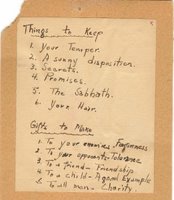
Things to Keep
1. Your temper
2. A sunny disposition
3. Secrets
4. Promises
5. The Sabbath
6. Your hair
Gifts to Make
1. To your enemies: Forgiveness
2. To your opponents: Tolerance
3. To a friend: Friendship
4. To a child: A good example
5. To all men: Charity
(1940s)
This was neatly written in ink on a small paper and glued to a piece of cardboard, shown above, which makes me think it was special enough to preserve and keep handy as a reminder for mom to stay on track. If so, this writing shows mom’s commitment to self-improvement and growth, a commitment that I witnessed throughout her life. She was always interested in keeping up with new developments in the sciences, etc, and loved learning through books and the newspaper (always clipping out articles) and TV shows like travel shows and National Geographic.
Equally important here, though, is the clear sense of moral and social values that mom had. She exemplified each of these, taught them to us both implicitly and explicitly all her life. That she wrote this (as opposed to copied it from somewhere) is suggested by item #6: “Keep you hair.” This was mom’s trademark. It symbolized her utter sense of discipline. She always “freshened up” before dad came home for dinner, and, until she was well into her 70’s, braided her own hair and kept it neat. I don’t know exactly when she first stopped this and began going to a hair salon, but that head full of long black neatly braided hair was a constant for us. It was more than a fashion statement: it was her philosophy—clear, straightforward, simple, neat, direct, unpretentious.
She literally lived this code of life, these eleven principles, and did her best to pass it on to us. There was really no mystery to mom, no misunderstanding her, no ambiguities, no double messages, no inconsistencies. She was totally congruent, was on the outside what she was on the inside. It is this level of wholeness and integrity that made it hard for all of us to emulate and perhaps, when we chose our own mates later in life, in some way, hard to really know and accept them for who they were, unconsciously measuring them against our own idealized parents, especially mom, in this case. Just a thought, though one with psychological support: It is difficult for sons to differentiate from such powerful mother figures and for daughters to find in men the qualities they see in their own idealized fathers.

No comments:
Post a Comment